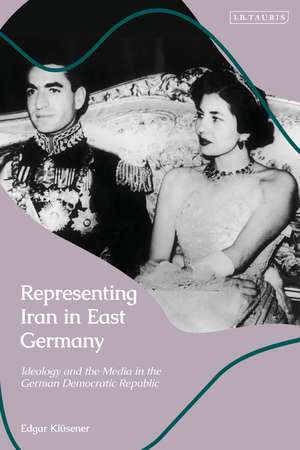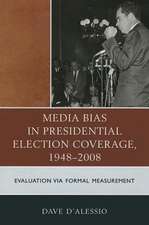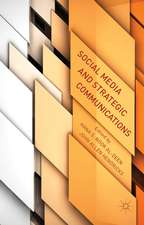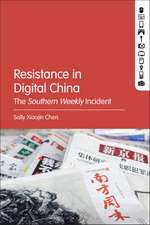Representing Iran in East Germany: Ideology and the Media in the German Democratic Republic
Autor Dr Edgar Klüseneren Limba Engleză Paperback – 16 noi 2022
| Toate formatele și edițiile | Preț | Express |
|---|---|---|
| Paperback (1) | 197.24 lei 6-8 săpt. | |
| Bloomsbury Publishing – 16 noi 2022 | 197.24 lei 6-8 săpt. | |
| Hardback (1) | 568.55 lei 6-8 săpt. | |
| Bloomsbury Publishing – 19 mai 2021 | 568.55 lei 6-8 săpt. |
Preț: 197.24 lei
Preț vechi: 257.59 lei
-23% Nou
Puncte Express: 296
Preț estimativ în valută:
37.76€ • 38.74$ • 31.80£
37.76€ • 38.74$ • 31.80£
Carte tipărită la comandă
Livrare economică 26 februarie-12 martie
Preluare comenzi: 021 569.72.76
Specificații
ISBN-13: 9780755641949
ISBN-10: 0755641949
Pagini: 224
Dimensiuni: 156 x 234 mm
Greutate: 0.31 kg
Editura: Bloomsbury Publishing
Colecția I.B.Tauris
Locul publicării:London, United Kingdom
ISBN-10: 0755641949
Pagini: 224
Dimensiuni: 156 x 234 mm
Greutate: 0.31 kg
Editura: Bloomsbury Publishing
Colecția I.B.Tauris
Locul publicării:London, United Kingdom
Caracteristici
Relevant to scholars of modern German history, modern Iranian history, Cold War history, journalism and media-studies, cultural studies and International Relations.
Notă biografică
Edgar Klüsener is Senior Lecturer in Music Journalism at the Manchester College of BIMM. Previously he was Teaching Assistant in Sociology at The University of Manchester, U.K, where he also completed his PhD. He has published numerous journal articles in German and is a professional journalist.
Cuprins
Chapter I - Framing the discourseGerman- Iranian relations in historical perspective East German - Iranian relationsEast Germany's press - the party's sharpest swordThe origins of the East German press systemControlling the press Chapter II - News as a businessThe Emergence of global news agencies global news monopoliesThe Allgemeine Deutsche Nachrichtenagenturb(ADN) - news and propaganda Chapter III - 1949 - 1960Economic interests, competition with West GermanyThe Mossadegh era: 1951 - 1953 Chapter IV - 1961 - 1969Our reader Annedore Schr Western sourcesFrom the Tudeh's point of view: how Iranian exiles used the press of the GDR Chapter V - 1970 - 1979Amicable relations and revolutions; Iran on the chessboard of the US global strategistsRally in Astara Chapter VI - 1980 - 1989Don't mention the warWar, neutrality and double-dealingsThe war - a business opportunity for the GDROpposition to the Islamic Republic
Recenzii
This is not only interesting for those who research GDR media history or the interdependencies between the SED state and Iran; rather, the work also offers new insights into the media presence of a representative of the (Global) South in a country of the "East" during the core phase of the Cold War.
'In this eloquently-written monograph, rich in empirical history tuned with relevant theory, Dr Klüsener fills in an intriguing shadowy gap in research on the relationship between the USSR's most important satellite - the German Democratic Republic and Iran, thereby making a number of exciting findings. It is conventional wisdom that during the forty years of its life span, the GDR merely managed to advance from the status of a vassal of the USSR to its junior partner, being entirely dependent on the Soviet Union in foreign affairs. However, as Dr Klüsener painstakingly proves in his research, the GDR's imposing apparatus of printed media functioned through a totally different mechanism in reporting on Iran, mostly relying on Western news sources. This analysis is tied to the key historical developments and the findings are the more crucial, given the GDR's role, entrusted by the USSR, as a proxy-handler of the Tudeh party - Iran's communists. The book is a must-read for both scholars of Iran and the Soviet Bloc and researchers into mass media in authoritarian societies.'
'In this eloquently-written monograph, rich in empirical history tuned with relevant theory, Dr Klüsener fills in an intriguing shadowy gap in research on the relationship between the USSR's most important satellite - the German Democratic Republic and Iran, thereby making a number of exciting findings. It is conventional wisdom that during the forty years of its life span, the GDR merely managed to advance from the status of a vassal of the USSR to its junior partner, being entirely dependent on the Soviet Union in foreign affairs. However, as Dr Klüsener painstakingly proves in his research, the GDR's imposing apparatus of printed media functioned through a totally different mechanism in reporting on Iran, mostly relying on Western news sources. This analysis is tied to the key historical developments and the findings are the more crucial, given the GDR's role, entrusted by the USSR, as a proxy-handler of the Tudeh party - Iran's communists. The book is a must-read for both scholars of Iran and the Soviet Bloc and researchers into mass media in authoritarian societies.'

























